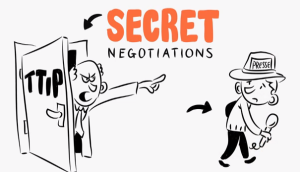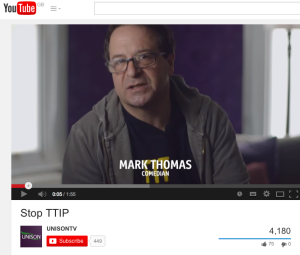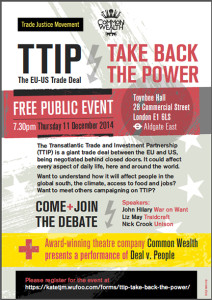 TTIP Take Back the Power flyer
TTIP Take Back the Power flyer
 Baby Milk Action is working alongside the growing number of NGOs, Unions and citizens such as War on Want, Trade Justice Movement, WDM and 38 Degrees and 120 organizations from 18 different EU member states, who are all opposing the TTIP negotiations going on between the EU and the USA. In the UK Baby Milk Action has attended two meetings with the UK Business, Innovations and Skills Department (BIS).
Baby Milk Action ISDS response
Baby Milk Action is working alongside the growing number of NGOs, Unions and citizens such as War on Want, Trade Justice Movement, WDM and 38 Degrees and 120 organizations from 18 different EU member states, who are all opposing the TTIP negotiations going on between the EU and the USA. In the UK Baby Milk Action has attended two meetings with the UK Business, Innovations and Skills Department (BIS).
Baby Milk Action ISDS response
In addition, these civic-minded and active Americans would be backed by 75 percent of Americans who think that the TPP should be rejected or delayed, according to a bipartisan poll from the Wall Street Journal. People know what these “pull–down” trade agreements have done to them in their own communities.”
http://www.informationclearinghouse.info/article41683.htm
________________
We are explaining how industry lawyers are using bullying tactics and flawed arguments to try to dissuade governments from implementing strict marketing controls such as the International Code and Resolutions. We are reminding the UK Government that it has a duty to protect child health and that TTIP can only make consumer and human and environmental rights protection much more problematic. CLICK HERE for a criticism of a previous Blog and Update 46 – along with our response to that criticism.Click on the short films on the left or click Here and HERE
CLICK HERE for a new article, CONFRONTING THE FORMULA FEEDING EPIDEMIC IN A NEW ERA OF TRADE AND INVESTMENT LIBERALISATION published in the JOURNAL OF AUSTRALIAN POLITICAL ECONOMY No By Julie Smith, Judith Galtry and Libby Salmon
At long last the NGO concerns are prompting consultations, petitions, media reports and rallying calls. Here are some of them:
NO TTIP DAY OF ACTION IN LONDON
European Citizens’ Initiative against TTIP and CETA to start soon
EU: Public consultation on modalities for investment protection and ISDS in TTIP For background papers and instructions for responding click here or here
The deadline for responses to this consultation has been extended to 13 July due to the level of high interest (14000 submissions).
War on Want response to the above consultation
Baby Milk Action ISDS response
Useful Resources:
Download this excellent booklet by John Hilary” The Transatlantic Trade and Investment Partnership: a Charter for deregulation, and attack on jobs, an end to democracy
http://trade.ec.europa.eu/consultations/index.cfm?consul_id=179
http://ec.europa.eu/yourvoice/ipm/forms/dispatch?form=ISDS
Media stories:
Rip up the TTIP http://www.thescottishfarmer.co.uk/news/rip-up-the-ttip.24357476Impact on baby food marketing
The Kogan Law Group is a New York City–based firm specializing in ‘identifying and addressing emerging regulatory, policy, and trade risks posed to multinational company assets, operations, and supply chains.’ Kogan, and the ‘non profit’ Institute for Trade, Standards and Sustainable Development (ITSSD – http://goo.gl/0qTBpa) cleverly use selected parts of trade agreements without recognising that governments have sovereign rights and duties to protect health.
Kogan argues that Hong Kong‘s draft code, that covers all products for children below 36 months, is not only trade restrictive, but will not protect breastfeeding. He proposes following the example of Australia, New Zealand and the UK – restricting the scope! With enough support governments can counter these flawed arguments and bullying tactics and go on to bring in much needed laws, implementing all WHA Resolutions.
UPDATE : We have received the comment below apparently from ITSSD taking issue with the above article. CLICK HERE for our analysis of this comment


Baby Milk Action’s reporting of ITSSD’s Lexis-Nexis articles have been ideological, hyperbolic and less than truthful.
Contrary to your organization’s reporting, the articles (one discussing Hong Kong’s laws and the other discussing the laws of the Philippines) clearly set forth the general presumption incorporated within the World Trade Organization Sanitary and Phytosanitary (“SPS”), Technical Barriers to Trade (“TBT”) and Trade-Related Aspects of Intellectual Property Rights (“TRIPS”) Agreements, which clearly recognize that states possess and maintain the sovereign right to regulate for the purpose of protecting public health and the environment.
The WTO SPS, TBT and TRIPS Agreements, however, also provide that states’ sovereign right to regulate on such bases is, however, subject to override where the facts demonstrate (as ITSSD’s articles argue) that the design or effects of the health or environmental regulation(s) is/are discriminatory in nature OR present(s) an unnecessary obstacle to trade (i.e., it serves as a disguised protectionist mechanism). In other words, these WTO agreements oblige contracting states to ensure that their rules are neither designed nor have the effect of discriminating between otherwise ‘like’ products, and that the rule(s) selected are the least trade-restrictive (and/or least trademark-encumbering) alternative available.
Contrary to your assertion, therefore, ITSSD’s analyses did NOT entail a “clever[] use [of] selected parts of trade agreements without recognising that governments have sovereign rights and duties to protect health”. Thus, your organization’s portrayal of ITSSD’s arguments as “flawed” is patently false. Rather, it is Baby Milk Action’s argument that is technically flawed.
In addition, your organization’s portrayal of ITSSD’s publishing of its Hong Kong analysis so that it may be reviewed by Hong Kong Government officials as a “bullying tactic” is a grand hyperbolic misrepresentation deserving of a drama award.
Rather, ITSSD’s publishing of its analyses was an effort to inject rational discourse into the heated emotional and ideological debate that Baby Milk Action has fomented, with the help of local UN agency offices, to frighten the public into believing what the organization and the UN wishes them to believe. ITSSD’s published Lexis-Nexis analyses of existing Philippine executive laws also was intended for such purpose – i.e. , to break the logjam of thinking that prevails in these governments because of the misinformation campaigns that Baby Milk Action and others have shamelessly propagated.
It is the duty of Hong Kong Government (and Philippine Government) officials to review ITSSD’s analyses, along with other analyses on the subject (including contrary arguments), if they provide essential information that Baby Milk Action’s distortive public ‘information’ campaign intentionally fails to provide.
Furthermore, Baby Milk Action does not wish to acknowledge the lack of verifiable “science” underlying its calls for total breastfeeding through 3 years of age, especially in Hong Kong where there are minimal concerns about unsanitary drinking water required for use of powdered follow-on formula. It also does not wish to acknowledge the lack of verifiable “science” underlying its allegations that follow-on formula is not nutritious for young children older than 1 year. The UN Food and Agricultural Organization (“UN-FAO”)’s Codex Alimentarius Commission (“Codex”) is currently reviewing food safety and nutrition standards for complimentary foods for children 3 years and older, and the World Health Organization and Codex are considering the review of nutrition standards. But, at the time of the writing of the ITSSD analyses, there were then NO current standards that covered such products consumed by children between 1 and 3 years of age. Indeed, what the Hong Kong studies have shown is a local preference for a sedentary lifestyle without much exercise and a cultural preference favoring certain foods to the exclusion of others.
Moreover, in some countries, like the Philippines, the quality of the food imports from China has much to be desired in terms of food safety. As a result, mothers might prefer to use follow-on formula that is manufactured in-country (using Philippine labor and technology) rather than rely on such imports for young children more than one year of age.
What Baby Milk Action would prefer is for Hong Kong’s proposed rule to be based on Europe’s post-modern precautionary principle so that causation-based science need not be applied. Under that scenario, there would be no need to prove a causal link between the consumption of follow-on formula by a child older than one year of age and either direct or indirect latent health (nutrition) effects years into the future (in adulthood). All that would be necessary to make a claim of future harm is some remote possible correlation – i.e., an opinion or ideological or fabricated ‘cultural’ preference.
Lastly, in the absence of such science, Baby Milk Action fails to acknowledge women’s right to choose whether or not to breastfeed their children older than one year of age through three years of age. The WHO standard, however, recognizes this right which it incorporates into its recommendation for partial breastfeeding, if so chosen, by the mother.
It is time for Baby Milk Action to come clean and let the public in Hong Kong, the Philippines and other East Asian nations know the truth – that, there is NO verifiable scientific evidence demonstrating the ill health or nutrition effects of consumption of follow-on formula by young children over one year of age. Sadly, Baby Milk Action is not in the business of conveying truthful information.
There is a Baby Milk Action response to the above comment on this LINK
http://www.babymilkaction.org/archives/1308